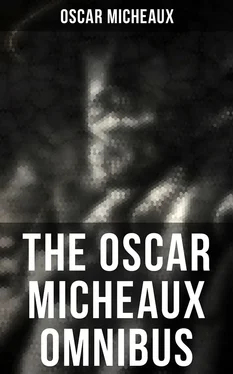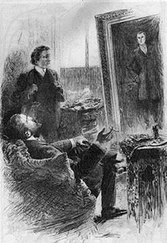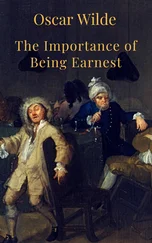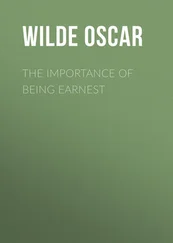I had to send for more money to pay my board. My brother, being my banker, sent a statement of my account, showing that I had to date just twenty-five dollars, and the statement seemed to read coldly between the lines that I would soon be broke, out of a job, and what then? I felt very serious about the matter and when I returned to Chicago I had lost some of my confidence regarding my future. Mrs. Nelson, the landlady, boasted that her husband made twenty dollars per week; showed me her diamonds and spoke so very highly of my brother, that I suspicioned that she admired him a great deal, and that he was in no immediate danger of losing his room even when he was out of work and unable to meet his obligations.
My next step was to let an employment agency swindle me out of two dollars. Their system was quite unique, and, I presume, legitimate. They persuaded the applicant to deposit three dollars as a guarantee of good faith, after which they were to find a position for him. A given percentage was also to be taken from the wages for a certain length of time. Some of these agencies may have been all right, but my old friend, the hoodoo, led me to one that was an open fraud. After the person seeking employment has been sent to several places for imaginary positions that prove to be only myths, the agency offers to give back a dollar and the disgusted applicant is usually glad to get it. I, myself, being one of many of these unfortunates.
I then tried the newspaper ads. There is usually some particular paper in any large city that makes a specialty of want advertisements. I was told, as was necessary, to stand at the door when the paper came from the press, grab a copy, choose an ad that seemed promising and run like wild for the address given. I had no trade, so turned to the miscellaneous column, and as I had no references I looked for a place where none were required. If the address was near I would run as fast as the crowded street and the speed laws would permit, but always found upon arrival that someone had just either been accepted ahead of me, or had been there a week. I having run down an old ad that had been permitted to run for that time. About the only difference I found between the newspapers and the employment agencies was that I didn't have to pay three dollars for the experience.
I now realized the disadvantages of being an unskilled laborer, and had grown weary of chasing a "will-o-the-wisp" and one day while talking to a small Indian-looking negro I remarked that I wished I could find a job in some suburb shining shoes in a barber shop or something that would take me away from Chicago and its dilly-dally jobs for awhile.
"I know where you can get a job like that", he answered, thoughtfully.
"Where?" I asked eagerly.
"Why, out at Eaton", he went on, "a suburb about twenty-five miles west. A fellow wanted me to go but I don't want to leave Chicago".
I found that most of the colored people with whom I had become acquainted who lived in Chicago very long were similarly reluctant about leaving, but I was ready to go anywhere. So my new friend took me over to a barber supply house on Clark street, where a man gave me the name of the barber at Eaton and told me to come by in the morning and he'd give me a ticket to the place. When I got on the street again I felt so happy and grateful to my friend for the information, that I gave the little mulatto a half dollar, all the money I had with me, and had to walk the forty blocks to my room. Here I filled my old grip and the next morning "beat it" for Eaton, arriving there on the first of May, and a cold, bleak, spring morning it was. I found the shop without any trouble—a dingy little place with two chairs. The proprietor, a drawn, unhappy looking creature, and a hawkish looking German assistant welcomed me cordially. They seemed to need company. The proprietor led me upstairs to a room that I could have free with an oil stove and table where I could cook—so I made arrangements to "bach".
I received no wages, but was allowed to retain all I made "shining". I had acquired some experience shining shoes on the streets of M—pls with a home-made box—getting on my knees whenever I got a customer. "Shining shoes" is not usually considered an advanced or technical occupation requiring skill. However, if properly conducted it can be the making of a good solicitor. While Eaton was a suburb it was also a country town and this shop was never patronized by any of the metropolitan class who made their homes there, but principally by the country class who do not evidence their city pride by the polish of their shoes. Few city people allow their shoes to go unpolished and I wasn't long in finding it out, and when I did I had something to say to the men who went by, well dressed but with dirty shoes. If I could argue them into stopping, if only for a moment, I could nearly always succeed in getting them into the chair.
Business, however, was dull and I began taking jobs in the country from the farmers, working through the day and getting back to the shop for the evening. This, however, was short lived, for I was unaccustomed to farm work since leaving home and found it extremely difficult. My first work in the country was pitching timothy hay side-by-side with a girl of sixteen, who knew how to pitch hay. I thought it would be quite romantic before I started, but before night came I had changed my mind. The man on the wagon would drive alongside a big cock of sweet smelling hay and the girl would stick her fork partly to one side of the hay cock and show me how to put my fork into the other. I was left-handed while she was right, and with our backs to the wagon we could make a heavy lift and when the hay was directly overhead we'd turn and face each other and over the load would go onto the wagon. Toward evening the loads thus balanced seemed to me as heavy as the load of Atlas bearing the earth. I am sure my face disclosed the fatigue and strain under which I labored, for it was clearly reflected in the knowing grin of my companion. I drew my pay that night on the excuse of having to get an overall suit, promising to be back at a quarter to seven the next morning.
Then I tried shocking oats along with a boy of about twelve, a girl of fourteen and the farmer's wife. The way those two children did work,—Whew! I was so glad when a shower came up about noon that I refrained from shouting with difficulty. I drew my pay this time to get some gloves, and promised to be back as soon as it dried. The next morning I felt so sore and stiff as the result of my two days' experience in the harvest fields, that I forgot all about my promise to return and decided to stay in Eaton.
It was in Eaton that I started my first bank account. The little twenty-dollar certificate of deposit opened my mind to different things entirely. I would look at it until I had day dreams. During the three months I spent in Eaton I laid the foundation of a future. Simple as it was, it led me into channels which carried me away from my race and into a life fraught with excitement; a life that gave experiences and other things I had never dreamed of. I had started a bank account of twenty dollars and I found myself wanting one of thirty, and to my surprise the desire seemed to increase. This desire fathered my plans to become a porter on a P——n car. A position I diligently sought and applied for between such odd jobs about town as mowing lawns, washing windows, scrubbing floors and a variety of others that kept me quite busy. Taking the work, if I could, by contract, thus permitting me to use my own time and to work as hard as I desired to finish. I found that by this plan I could make money faster and easier than by working in the country.
I was finally rewarded by being given a run on a parlor car by a road that reached many summer resorts in southern Wisconsin. Here I skimped along on a run that went out every Friday and Saturday, returning on Monday morning. The regular salary was forty dollars per month, but as I never put in more than half the time I barely made twenty dollars, and altho' I made a little "on the side" in the way of tips I had to draw on the money I had saved in Eaton.
Читать дальше












